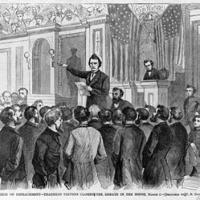Topics in the History of Political Thought
Overview
This module provides an opportunity to study in depth topics of central interest in the History of Political Thought. It will focus the major works of a particular figure and the main lines of criticism of that thinker, from other contemporary figures, later political theorist, and modern scholars and critics; on a historical moment or controversy which elicited a number of works by different thinkers; the interconnections between a given group of thinkers.
It will also consider issues of interpretation and historiography, particularly when there are differing, controversial readings of the theorist, or moment, or group in question. Political thinkers who will be studied include Hobbes, Locke, Rousseau, Hume, Smith, Kant, Hegel, Tocqueville, Marx, Mill, Weber, Schmitt, Arendt, and Strauss. ‘Moments’ will include the birth of the modern state, the English civil war, the French and Russian Revolutions, the rise of totalitarianism and the collapse of the Weimar Republic. Groups will include the Social Contract theorists, Theorists of representation, Historicists and anti-historicists, The New Left and the Neoliberals.
The course will be taught as a seminar in the History of Political Thought, with an emphasis both on understanding and critical engagement with the ideas of the figure, figures, and texts under examination, and on the intellectual and political contexts of their works.
Learning Outcomes
By the end of this module, students will have;
- Acquired a thorough grounding in the history of political thought.
- Acquired knowledge of decisive figures and moments in the history of political thought.
- Developed critical and argumentative skills through seminar discussion and analysis of philosophical texts.
- Developed skills of careful reading, concentration, and clear exposition through the reconstruction and criticism of textual arguments.
Assessment
One essay of 4000 words (100% of total mark).

